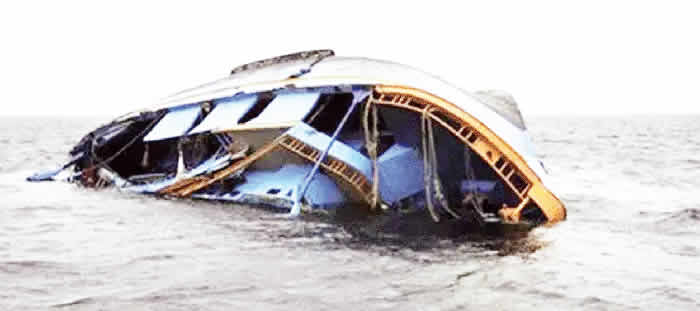
The National Inland Waterways Authority has said it will make use of local manpower to enforce operational guidelines on the nation’s waterways to prevent a recurrence of last Monday’s Kwara boat accident that claimed no fewer that 106 lives.
The Managing Director, NIWA, Dr George Moghalu, disclosed this in a chat with journalists during his visit on Saturday evening to the Patigi Local Government Area of Kwara State where the boat accident happened.
Moghalu, who led a NIWA delegation to make an on-the-spot assessment of the situation in Patigi communities, said preliminary investigation had revealed causes of the incident, vowing that all indicted persons would be punished.
“Preliminary investigations have shown that the accident was avoidable if specific protocols were followed.
“Experience has shown that over 95 per cent of accidents that happen on our waterways occur either in the night or very early hours of the morning and the reason is that the vessel could not apply navigational aid.
“Secondly, the vessel in question was very heavily overloaded. The vessel carried over 250 passengers. It was practically impossible for the vessel to operate safely without having a hitch. Apart from passengers, we had leakages in the vessel.”
According to NIWA MD, the boat ought not to carry more than “between 50 and 60 passengers.”
“Most of these vessels don’t have night navigational aids, making the movement a risky venture. The vessel carried passengers five times more than what it should.
“Most unfortunately, all the passengers were not wearing life jackets and it was a very rainy night. The rain came with wind. Apart from increasing the water level, the wind was tossing the boat here and there and eventually smashed it against a tree,” Moghalu added.
He, however, noted that investigation into the accident had not been concluded.
“A team to assess environmental impact assessment of the incident would come to the area in order to determine provision of either jetty or ramp to improve movement in the area. Part of our responsibility is to ensure security and safety of the people.
“Part of the message to the people is that you cannot operate your vessel after 6pm. The operational time is between 6am and 6pm. They should wear life jackets before entering any vessel. The vessel must not be overloaded. We would be using local media, traditional and religious institutions and community stakeholders to pass the message across to the people.
We will also continue training of operators to standardise operation all over the country,” he said.
Moghalu said there were instances where boat operators had been arrested, sent to prisons, and their vessels were either impounded or destroyed when considered not river-worthy.
He lamented that not all vessel operators were licensed or registered, saying NIWA would continue registration of vessel operators to ensure safety of waterways.




